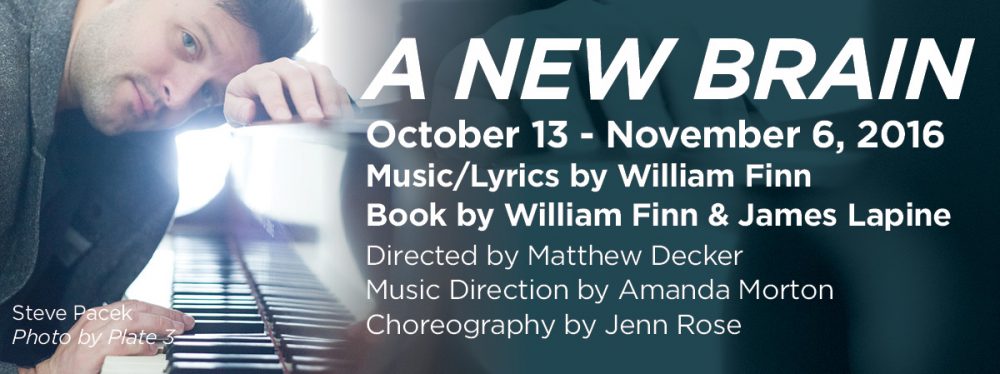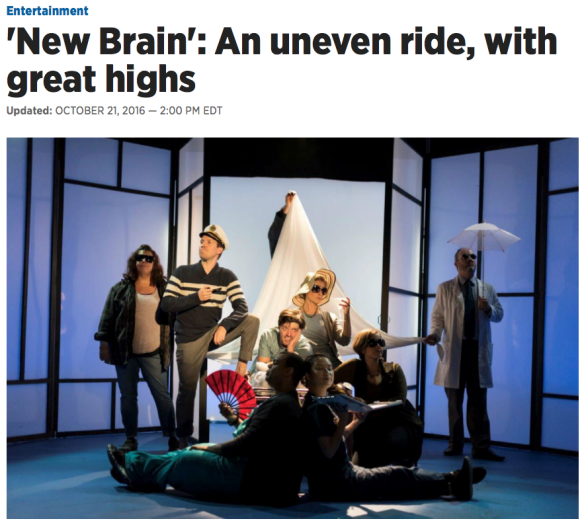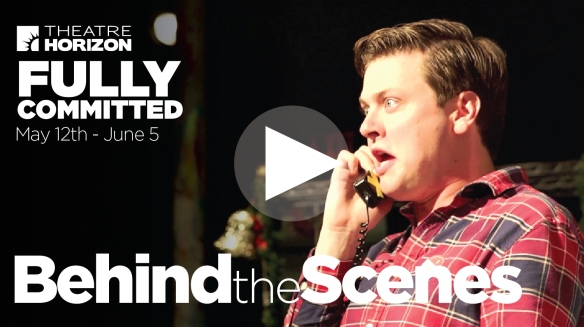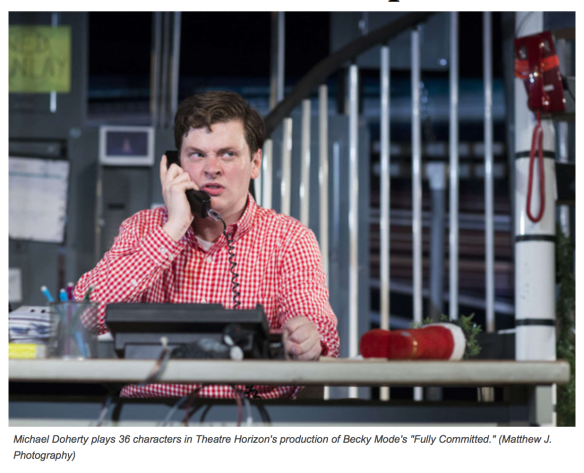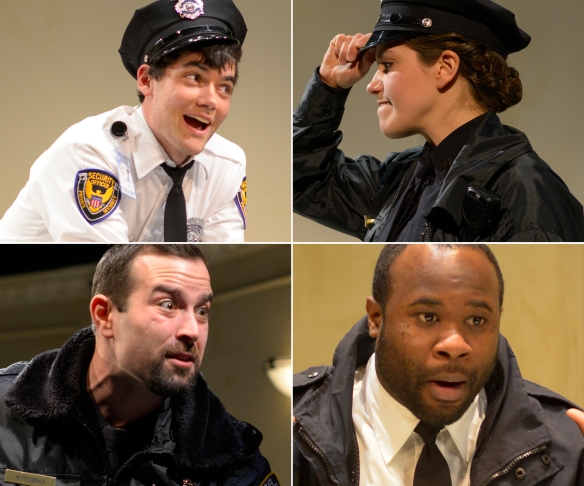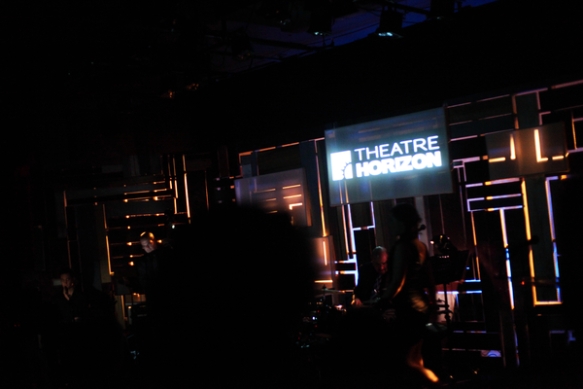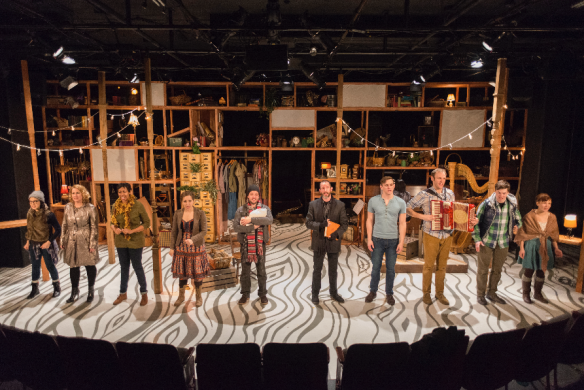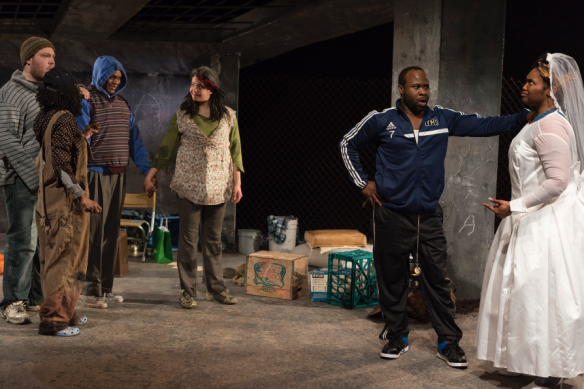Now playing at Theatre Horizon in Norristown, A New Brain is an autobiographical musical comedy written by Tony Award winners William Finn (The 25th Annual Putnam County Spelling Bee) and James Lapine (Into the Woods) that explores one man’s response to a life-threatening medical diagnosis. The 1998 play based on Finn’s own experience of finding out that he had a potentially deadly “arteriovenous malformation” – a tangle of blood vessels – in his brain, and having little choice but to go through a risky neurosurgery to save his life.
Tag Archives: Theatre Horizon
The ultimate split personality: One actor, dozens of roles – Philly.com
Becky Mode’s Fully Committed – now playing at Theatre Horizon in Norristown – is a one-person show with nearly 40 separate roles. It’s a true tour de farce. Our reviewer Wendy Rosenfield said it was a great reason to stay in Philly to see the show rather than travel the New Jersey Turnpike up to New York to see it. Michael Doherty is, by all reports, hilarious in the athletic role of Sam the chef and 36 others. Here is a clip from the show, provided courtesy of Theatre Horizon:
FULLY COMMITTED is fully hilarious!
The Philadelphia Inquirer says our “one-man show hits the spot”, calling it “plenty funny” and “fun to watch”! Click on the image below for the whole article.
The central question posed by “Lobby Hero”
A NOTE FROM THE ARTISTIC DIRECTOR
Injustice in America’s justice system is nothing new, but horrifying police brutality captured on iPhone videos has raised consciousness across the country. Racial bias, and arguably unjust rulings by judges and juries, has galvanized the nation and launched the Black Lives Matter movement. Meanwhile, sexism in the workplace continues to simmer just below the radar of the national media…a prejudice so familiar, apparently it’s not worth covering.
So, it’s critical for us to consider how we will behave in an unjust world. Should I follow the rules even if they are unfair? This is the central question posed by Lobby Hero.
I first came across this play while auditioning for the role of Dawn in a Walnut Street Theatre production of the play nearly a decade ago. I called Matt Decker who was then living in New York city, and said, “You have to read this script right now!” Because we were too broke to buy a copy, he read the play at a Barnes and Noble in Manhattan while I thumbed through the Walnut’s copy in Philly.
What hooked us on the play ten years ago, and why it’s more timely than ever, is that every character feels he or she has been wronged. I think many of us feel that way right now.
Injustice is something we can all sense for ourselves, felt first like a punch to the gut that then works its way up to the heart. What the playwright asks us to consider is, once you feel that pang of injustice, what are you willing to do about it? And how will you know you were right?
Sincerely thanks,
Erin Reilly
Diana Millner: A Powerful Force Behind the Success of Theatre Horizon in Norristown, PA
In loving memory, we at Theatre Horizon are dedicating our production of Black Nativity to Diana Millner.
DIANA AUBOURG MILLNER was born in Cambridge, Massachusetts on February 26, 1975 to Joseph Amerlin Aubourg and Marie Immaculee Aubourg. Diana departed this life surrounded by her husband, parents, siblings and brother-in-law on August 12, 2015, after a four-year struggle with breast cancer.
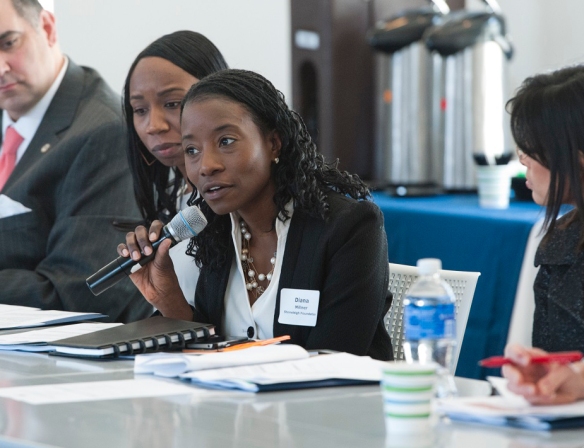
Stoneleigh Foundation Senior Program Officer Diana Millner shares her thoughts on the possible involvement of funders in youth safety initiatives. Photo courtesy of the City of Philadelphia, Kait Privatera
Diana was the third of four children, and the first girl born to Joseph and Marie, Haitian immigrants to America. When Diana was two-and-a-half, her parents feared that she would never talk. She remained silent, quietly observing other people’s conversations, but never saying a word. One Labor Day weekend in 1977 the family went on a road trip to Montreal. While driving on a busy road in Montreal, Diana suddenly stood up from her seat and started singing and never stopped until they got to their destination. This was only the beginning Diana’s amazing journey in becoming a phenomenal woman.
Raised in East Cambridge, Diana attended St. John’s the Evangelist School, graduated from Cambridge Rindge & Latin High School in 1993. Diana attended Syracuse with a bachelor’s degree in policy studies, earned a master’s degree in international development planning from the Massachusetts Institute of Technology. Working with a variety of service organizations throughout her career, Diana spent almost 15 years working to improve systems and inform public policy, in service of vulnerable children.
Her career highlights can be read in detail on Norristown’s Patch.
Marlon Millner and Diana married on Sept. 16, 2006 at Memorial Church at Harvard University. They made their home in Norristown, PA, where Diana gave birth to a son, Edouard Josef, in 2007 and a daughter, Immaculee Jeanette, in 2009. Diana was always a devoted and supportive wife and mother.
Diana loved the arts. A gifted dancer, Diana moved into philanthropy but used her understanding of fundraising to help worthy causes in the arts. One such cause was Theatre Horizon, which was founded by Erin Reilly and Matthew Decker in Norristown around the same time Diana and Marlon also moved to the town. Diana, Erin and Matthew came to Norristown for the same reasons – they saw that the needs in Norristown were great, and wanted to make a difference.
With educations from the finest universities, Diana and Marlon could have gone anywhere, but they chose Norristown. They quickly became leaders in the town, Marlon on Municipal council, and Diana behind the scenes and definitely at Theatre Horizon.
When Theatre Horizon constructed and opened our new theater on DeKalb Street in 2012, Diana and Marlon both worked tirelessly to make sure our first show there — PRETTY FIRE, a play about a charismatic young black woman and her family — was a success, bringing out dozens of people to our first play.
When Theatre Horizon needed funding in 2013, Diana helped us craft a winning pitch to a large Philadelphia foundation that has sustained their funding ever since. When we launched a Diverse Voices Reading Series to present stories by and for black actors, playwrights and directors, Diana became an honorary producer of the year-long event. When we produced a play called OUT OF HARM’S WAY through Weed and Seed (another worthy Norristown program Diana helped get funding for) to give parents tools to keep their kids safe from guns and drugs, Diana was there, participating and moving the conversation forward. She shared statistics with the theatre about the appalling risk factors our town’s children, especially young black men, were facing.
One gorgeous fall afternoon a few years back, Diana and Erin took their kids to Diana’s favorite playground in Chestnut Hill for a playdate. That afternoon, as they dug in the sandbox with their kids, they talked of their hopes and dreams for Norristown. They discussed ways of combating the entrenched problems of poverty and racism. They talked about who might help subsidize arts education for Norristown children, and how could they make it possible for Norristown kids to get free access to arts education.
Diana would be so glad to know that after three years of planning, that plot she and Erin hatched for a class for Norristown children finally became reality this year, as Theatre Horizon begins teaching a weekly drama class for children on public assistance. The class is a partnership with our upstairs neighbor at 401 Dekalb Street, The Willow School. Thanks to Diana, the lives of kids living at the poverty line will be deeply impacted this year.
It only took that one afternoon for Diana to make a deep impact on Erin’s life, too.
That afternoon at the playground, Diana and Erin watched their kids play together, their lucky children from 2-parent families with resources, and they talked about the Norristown kids who aren’t so lucky.
At Diana’s funeral on August 22nd, Erin addressed the mourners and said, “When one mother passes from this earth, it is the duty of other mothers to pick up her work for her, and carry it on. And that is what I plan to do at Theatre Horizon and beyond, with love and in partnership with Diana’s Norristown friends and neighbors.”
It’s A Privilege & A Joy
Monday afternoon, we at Theatre Horizon huddled around our smartphones to await the Barrymore nomination announcements from the Theatre Philadelphia press conference…
…we are so pleased and honored to have received the nomination for the following categories:
- Outstanding Overall Production of a Play: In the Blood
- Outstanding Overall Production of a Musical: Into the Woods
- Outstanding Direction of a Play: Pirronne Yousefzadeh, In the Blood
- Outstanding Direction of a Musical: Matthew Decker, Into the Woods
- Outstanding Leading Actor in a Musical: Steve Pacek, Into the Woods
- Outstanding Leading Actress in a Musical: Rachel Camp, Into the Woods
- Outstanding Supporting Actor in a Play: Akeem Davis, In the Blood
- Outstanding Supporting Actor in a Musical: Alex Bechtel, Into the Woods
- Outstanding Supporting Actor in a Musical: Charlie DelMarcelle, Into the Woods
- Outstanding Supporting Actor in a Musical: Michael Doherty, Into the Woods
- Outstanding Supporting Actress in a Musical: Liz Filios, Into the Woods
- Outstanding Supporting Actress in a Musical: Leigha Kato, Into the Woods
- Outstanding Scenic Design: Brian Dudkiewicz, In the Blood
- Outstanding Costume Design: Lauren Perigard, Into the Woods
- Outstanding Lighting Design: Cecilia Durbin, In the Blood
- Outstanding Music Direction: Amanda Morton, Into the Woods
- Outstanding Ensemble in a Play: In the Blood
- Outstanding Ensemble in a Musical: Into the Woods
- Virginia Brown Martin Philadelphia Award: In the Blood
We thank the Philadelphia and Montgomery County communities and beyond for believing in us so fully! Congrats to all of our beautifully talented actors, production persons and everyone else behind the scenes who represent Theatre Horizon in a magnificent way. You’ve made us so proud!
Read our Artistic Director, Erin Reily’s thoughts on PhillyMag.
A Note from the Director of INTO THE WOODS
The origin of fairy tales stems from folks gathered around the fireside telling each other stories to escape their tedious proclivities. Those stories were often quite sinister and violent, teeming with vulgar language and depicting characters that were full of anxieties, fears and sexual desires. They were also not read from a book but told orally, with each narrator getting a chance to put their own spin on it. To quote contemporary English novelist Angela Carter, “asking where a fairy tale came from is like asking who invented the meatball.
Every narrator reinvents the tale.” As time went on, these oral renditions – that existed in various versions in virtually every culture in the world – were collected and written down and as their popularity grew, were revised thoroughly and geared more towards children, expunging all material that was deemed unsuitable for young ears; essentially purifying the heroes and taming the monsters. These are the versions that we are familiar with today – and mostly because of their immortalization on screen by Walt Disney – the versions that we continue to tell our children.
When crafting Into the Woods, Stephen Sondheim and James Lapine riffed on these famous fairy tale characters by looking at them from the other side of the coin. Their Cinderella is a young woman who can’t make up her mind about loving a prince, Jack is a boy who essentially disobeys his mother and steals from the Giant, Little Red is a bloodthirsty kid, and the Witch is the most honest and direct of all the characters. That examination seems much more in line with the original tellings; by exploring the psychological complexities and motivations of these characters they’ve made them feel less like fairy tale archetypes and instead, more human.
Into the Woods seems to be virtually everywhere these days, showing up on numerous school, amateur and professional stages, and most recently in the glittering film adaptation. The musical, first performed in 1987, seems to have become almost as ubiquitous as its source material; entering a phase in its existence where it is reinvented each time it’s told by the artists that present it. Our version of Into the Woods keeps that in mind, and is inspired by this incredibly gifted ensemble, who are utilizing their skills not only as actors, but also as instrumentalists, puppeteers and creative devisers. We built this production specifically around their talents, in hopes that we might hear the story in a way that is unique to this ensemble while celebrating them as great storytellers.
At its core, Into the Woods is about fairy tales, but I think it also is about taking action, moving forward and making decisions. We all have to go “into the woods” to continue to find, or pursue, happiness and meaning in our lives. Act I of the play is all about each individual character getting what they want, to achieve that goal of living “happily ever after.” But then Act II is all about what happens after “happily ever after” and dealing with the consequences of their pursuits – something that typical fairy tales ignore. That, for me, is where the real magic of Into the Woods lies. When a threat faces the kingdom, the characters must make decisions that are for the good of the community, looking not at the individual want anymore but the communal need. That message – one that calls us to set aside our differences in times of strife in favor of investing in humanity – feels like a welcome and necessary reminder in these times, and what makes Into the Woods a story that deserves to keep being told. (Besides that glorious score!)
Thank you to this fearless group of actors, designers and artisans who have thrust themselves wholeheartedly into this endeavor. And thanks to you, the audience, who are with us this evening. Every storyteller needs someone who’s willing to hear him spin his tale, and whether this is your 1st or 10th year at Theatre Horizon, I am grateful that you’re listening.
Matthew Decker
Director, Into the Woods
Notes from the Rehearsal Room – How I Learned to Drive
“Family is family.”
One of my favorite lines from Paula Vogel’s explosive and deeply personal play, “How I Learned to Drive”. Our guide, a strong and damaged woman, Lil’ Bit, takes us on a journey through her adolescence–her struggles, her triumphs, and her painful relationship with her equally damaged Uncle Peck. As we jump from year to year, we see a young woman with no father, a rough and tumble family, and an uncle who is looking for someone to keep at bay, as he puts it, “the fire in his heart”. Lil’ Bit searches for someone who understands her intelligence, passion, and humor, but Uncle Peck’s attentions confuse and combine all kinds of love, creating a web of ambiguity that she spends a lifetime unraveling.
On the surface, Ms. Vogel’s play sounds like an open and shut case of right and wrong, good and bad. What is so very brilliant about her deft and poetic language is that she moves beyond the black and white of a seemingly dangerous issue and explores the gray areas. Abuse, relationships, family–we all know in our own lives that they are complex and ever changing. It is satisfying to attend a play that allows the audience to be a part of the collaborative process. We do not participate, but we are allowed to ask questions and connect to the piece individually. A play not as much about judgment, but about the journey–and after all, isn’t that what we all are on in life?
During our first few weeks of rehearsal the actors have been deeply mining the text and bringing their own journeys to the work. Christie Parker and Joe Guzman (as Lil’ Bit and Peck) have created richly textured characters and their scenes onstage are electric. Our Chorus actors have found the humor in a wild and raucous family, but are bringing truth and dignity to them as well. What is so special about Theatre Horizon and Ms. MacMillan’s direction is the collaborative and open atmosphere that can’t help but be reflected onstage. In a play that seems to be focused on darkness, they are bringing the light.
